A Pan in Your Hand: Testing out 11 NEW Colours in the Daniel Smith Extra Fine Watercolour Stick Range
Daniel Smith Watercolour Sticks are a versatile drawing and painting tool that let you combine the best of your sketching and watercolour techniques. The brand have recently introduced 11 new colours to the range, bringing a more versatile palette of hues along with two new luminescent colours. We took them for a test run and found out how they fit into the wider Daniel Smith Watercolour range.
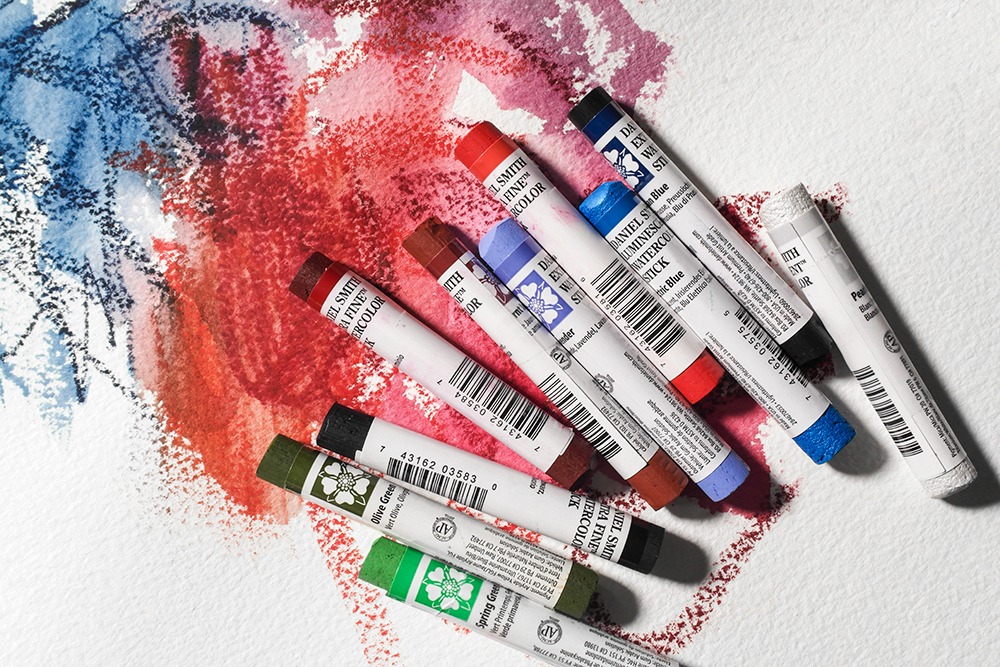
Including the 11 new hues, the Daniel Smith Extra Fine Watercolour Stick range is available in 62 colours. These new additions bring in some old favourites like Carmine and Prussian Blue, along with some more unusual colours from their Luminescent range. Overall the full range of 62 colours includes a broad spectrum of traditional hues, Primateks and now luminescents. Each stick costs less than a 15ml tube of Daniel Smith paint, but contains a higher pigment load – making them a more affordable way to test out colours. We put the new colours to the test – read below to find out more about watercolour sticks or jump to our painted swatches for more colour information.
What are Daniel Smith Extra Fine Watercolour Sticks?
Daniel Smith Extra Fine Watercolour Sticks are essentially a dried watercolour paint moulded into a stick form. They’re made from the same high quality ingredients as the rest of their watercolour range, so you can expect the same high pigmentation as you get from their tubed colours. Portable and long lasting, they’re a great medium for artists on the go.
How do I use Daniel Smith Watercolour Sticks?
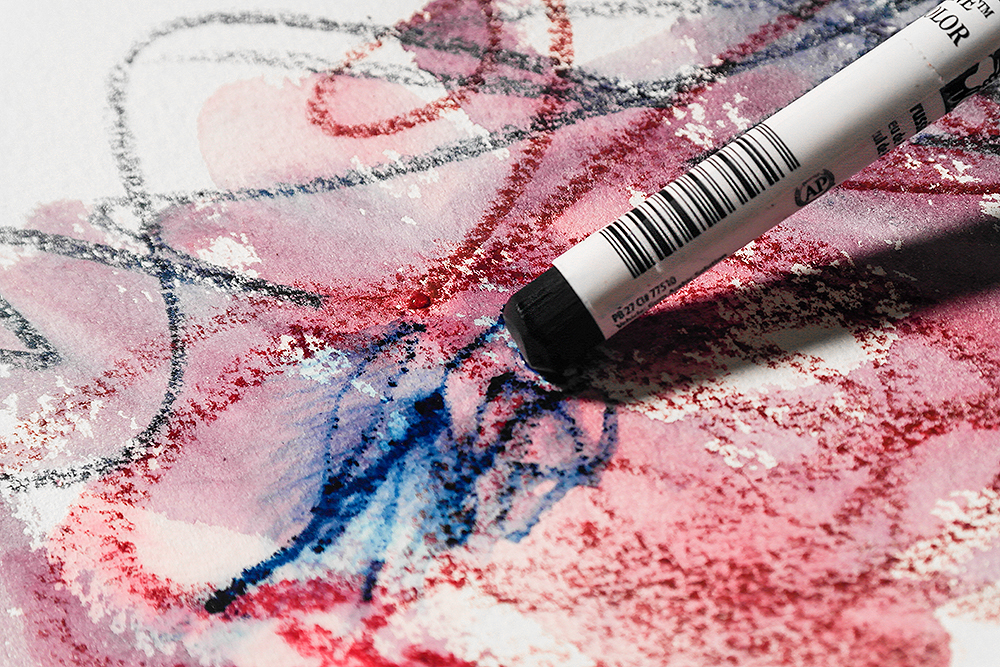
Daniel Smith Watercolour sticks are primarily designed to be drawn with. Use them dry – like a pastel – to create a broad range of marks and strokes. However, you really unleash their true potential by using them with water. Try sweeping a wet brush over the dry marks and watch as the dry colour floods into the wash. Marks dissolve away quickly and the stick itself is easy to rewet. You can also use a dry stick to draw onto wet paper, or lift colour directly from the stick with a wet brush – like you’d use a traditional pan. In fact, each stick is equivalent to around 3 whole pans. You can easily cut up a stick and press it into an empty pan. This is a fast and economical way to test out a new palette of colours.
Excellent value for money
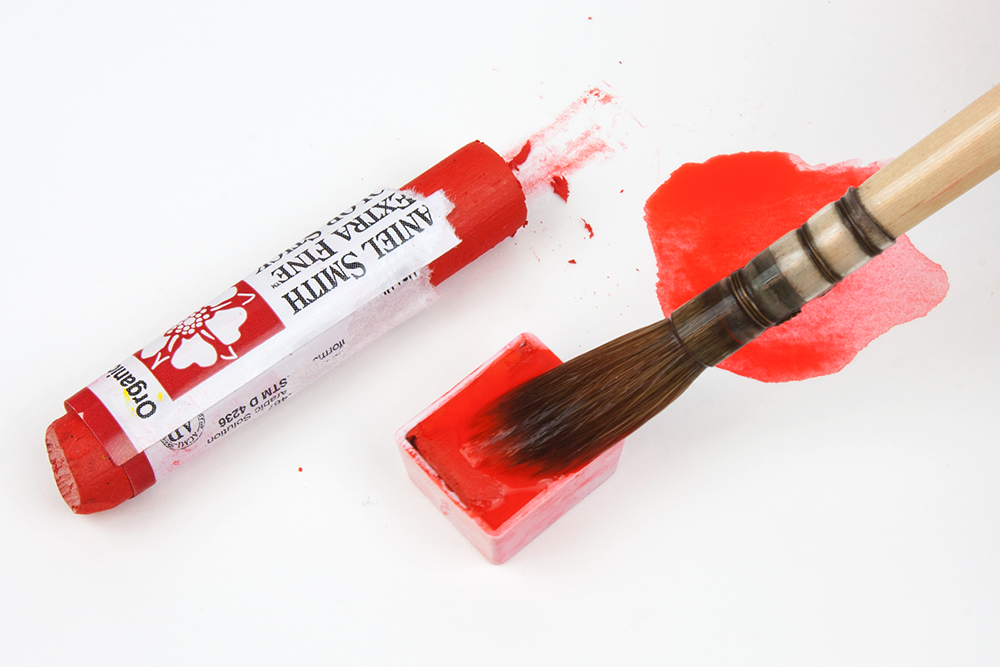
As mentioned above, each stick is equivalent to a whopping 3 whole pans of colour. The price of every single stick in the range is exactly the same – regardless of the series the colour would usually fits into. This means that a Primatek or high series colour, like Serpentine Genuine, costs you a fraction of what it would cost for a full 15ml tube.
Texture
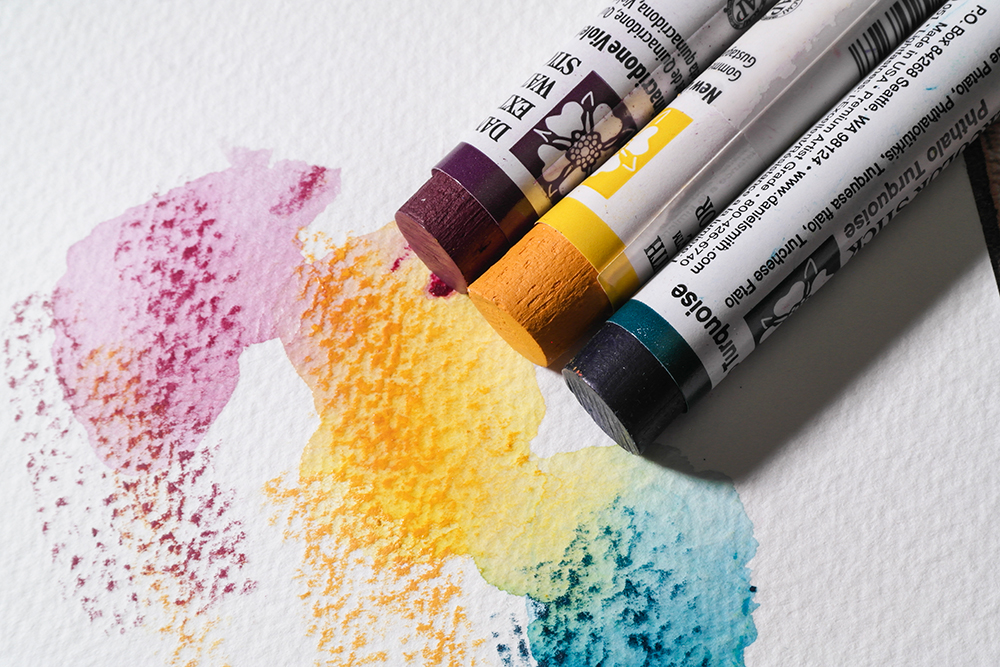
Texture-wise, Daniel Smith aren’t as dry as some other brands. They have a dense, almost tacky texture similar to a watercolour pan. Colours do vary quite a bit in softness. Some almost feel as soft as a kneaded eraser and can be easily shaped. Others are a little harder and take a bit more work to laydown colour.
Pigmentation
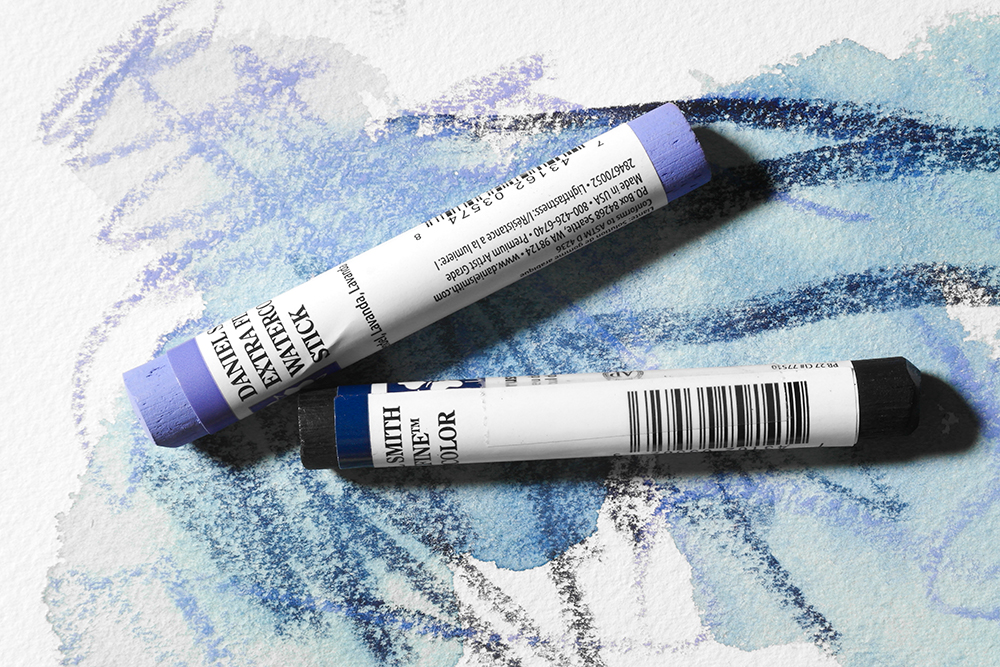
One benefit of these sticks over other water soluble blocks is that you know precisely what colour you are using. Other blocks, like Caran d’Ache Neocolor II and Derwent Inktense don’t come with any specific pigment information. While the colours are beautiful and both brands assure users that the ranges offer good lightfastness, there is some reassurance in knowing more about the materials you’re working with. Daniel Smith print all the pigment information on the side of the stick and there is further information available if you click on the colour swatches on our website.
What are the new colours in the Daniel Smith Watercolour Stick Range?
The 11 colours below have recently been added to the Daniel Smith Watercolour Stick range. Find out more about each colour by clicking the underlined link, or by scrolling down to read the full list.
- Burnt Yellow Ochre
- Carmine
- Iridescent Electric Blue
- Ivory Black
- Lavender
- Mayan Orange
- Neutral Tint
- Olive Green
- Pearlescent White
- Prussian Blue
- Spring Green
Burnt Yellow Ochre
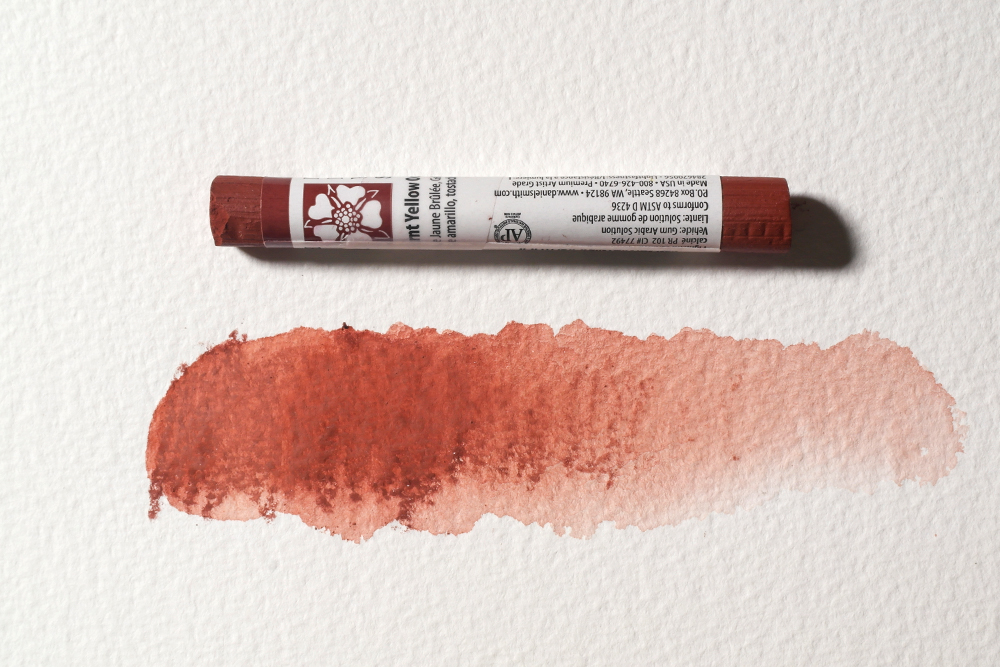
Burnt Yellow Ochre falls somewhere between Yellow Ochre and Burnt Sienna. It is a versatile colour that is particularly useful in transparent, light washes where it will create glowing skin tones. This earth colour has a reddish warmth that evokes the hues of ancient pottery and sunsets.
Lightfastness: Excellent
Transparency: Transparent
Staining: Low
Granulation: Yes
Pigment: PR102 (Calcined Yellow Ochre)
Carmine
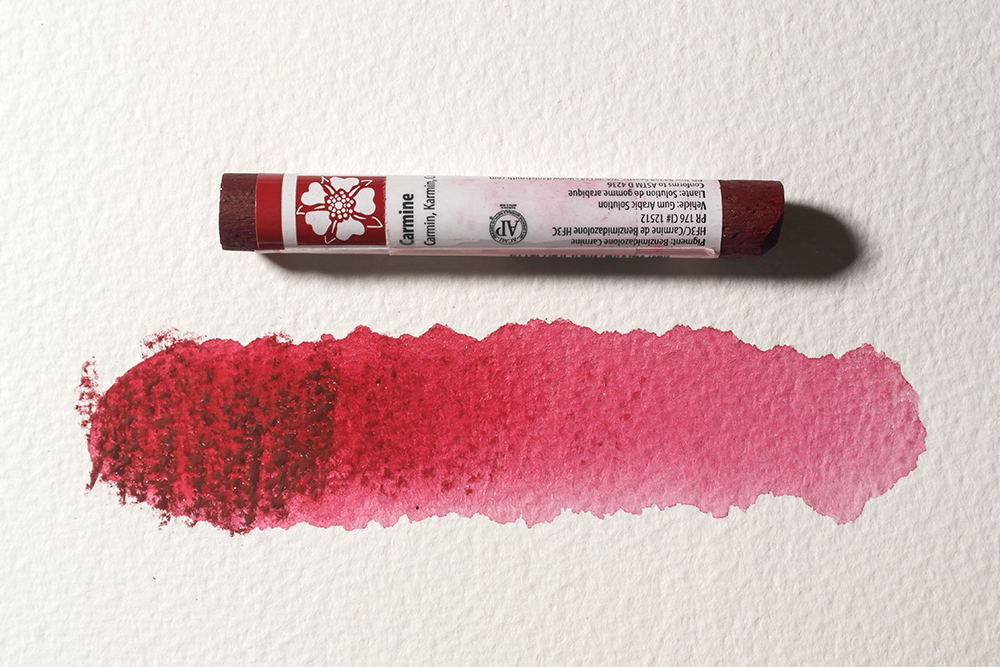
Carmine offers a darker, redder, more staining alternative to Alizarin Crimson – with the benefit of vastly improved permanence. It is the darkest of all Daniel Smith’s reds, offering a rich, intense hue that retains luminosity. Dilute to create more subtle tones without any reduction in permanence. It pairs well with its complement, Phthalo Green to create clear neutrals.
Lightfastness: Very Good
Transparency: Semi-Transparent
Staining: High
Granulation: No
Pigment: PR176 (Benzimidazolone Carmine)
Iridescent Electric Blue
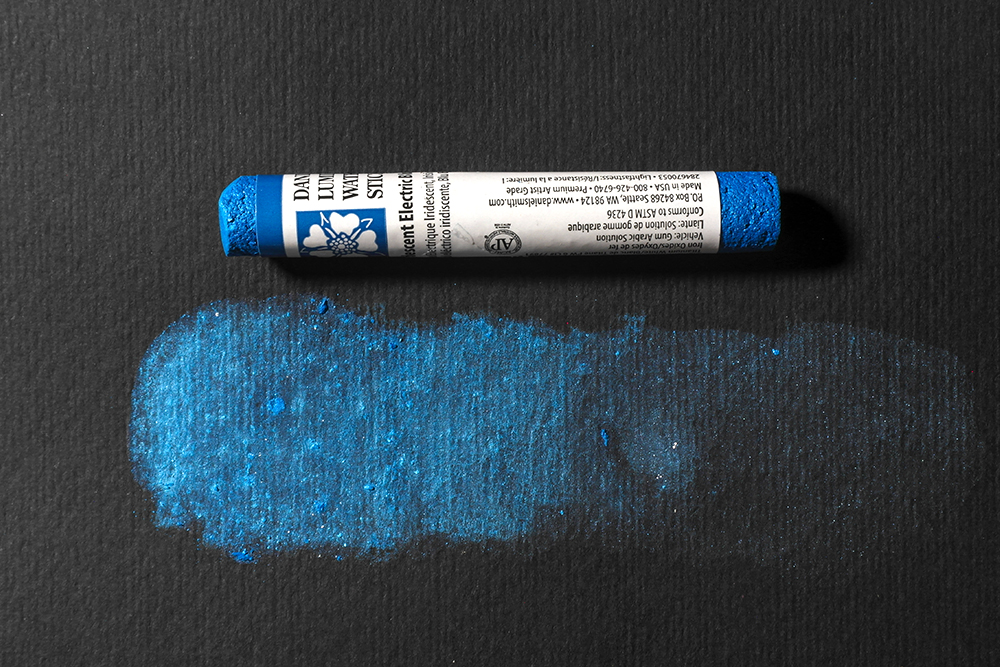
One of the two new Luminescent colours in the range, Iridescent Electric Blue is a punchy, shimmering hue. It combines radiant blue with subtle iridescence – bringing to mind the electric colour of a peacocks feathers. It creates particularly striking results on black watercolour paper, where the gentle shimmer of the mica really shines through. Use is in glazes over darker colours or mix with other colours to give them a luminescent glow.
Lightfastness: Excellent
Transparency: Transparent
Staining: Non staining
Granulation: Yes
Pigment: PW20, PW6 (Mica – Titanium White – Iron Oxide)
Ivory Black
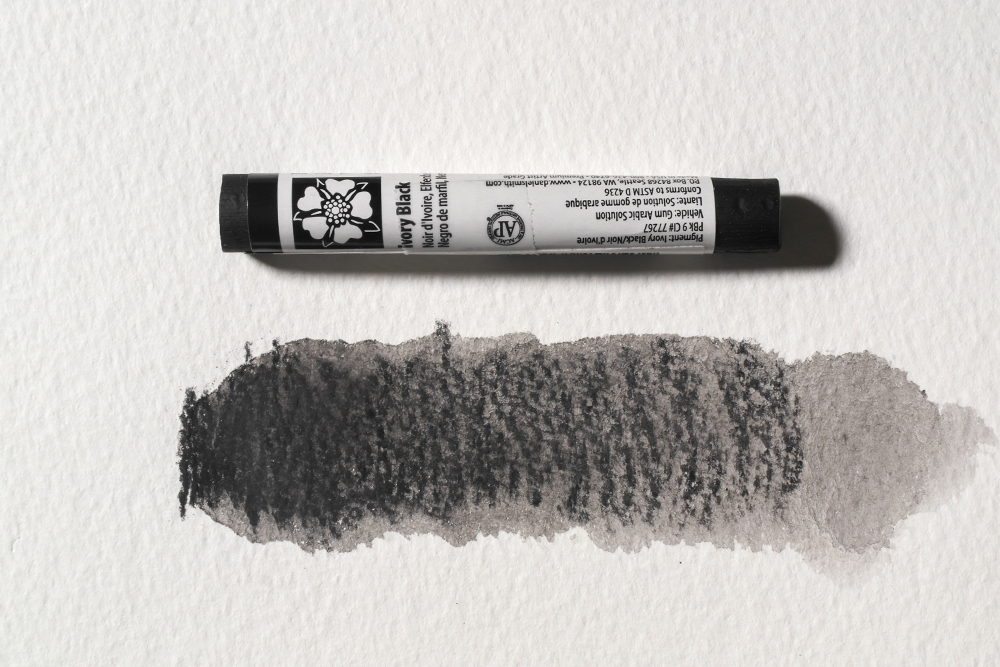
Ivory Black has a low tinting strength and a warm yellowish-brown undertone. As its name suggests, Ivory Black was once made from burnt ivory sourced from now endangered animal species. While this is no longer the case, contemporary Ivory Black pigment (PBk9) still uses carbonised animal bones that are by-products of the meat industry. This is something to consider if you are trying to elimate animal-derived materials from your practice.
Lightfastness: Excellent
Transparency: Semi-Transparent
Staining: Low
Granulation: Yes
Pigment: PBk9
Lavender
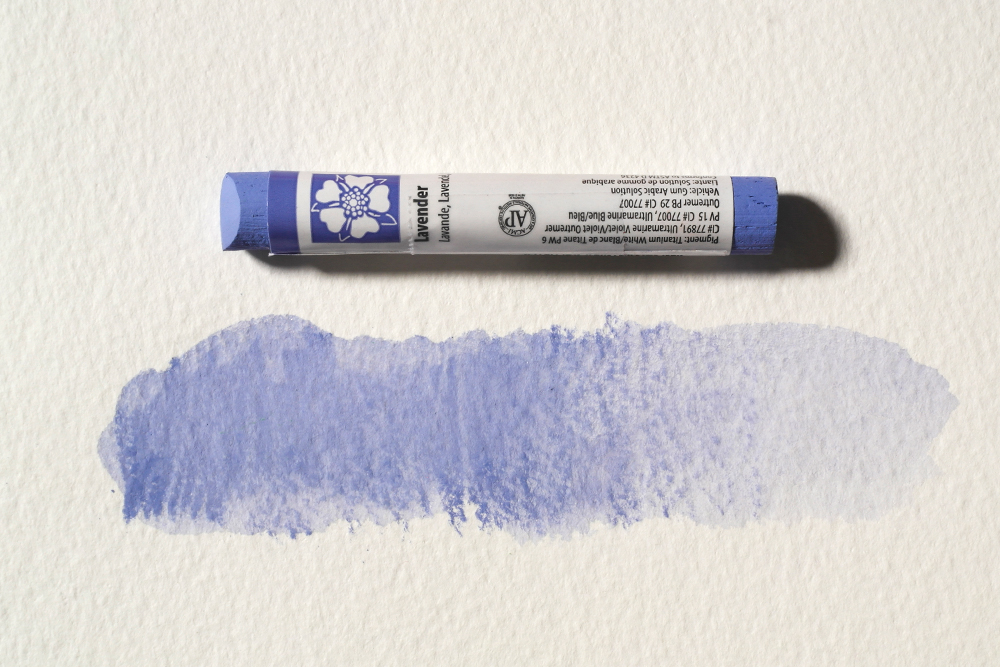
Lavender is a stunning periwinkle blue that is strikingly different to the other blues available in the Daniel Smith range. First introduced as a new colour in 2017, it quickly became a customer favourite offering something a bit unusual and different. It is an excellent colour for use in floral paintings and hints at shades of faded denim.
Lightfastness: Excellent
Transparency: Semi Transparent
Staining: Low
Granulation: Yes
Pigment: PW6, PV15, PB29 (Titanium White – Ultramarine Violet – Ultramarine Blue)
Mayan Orange
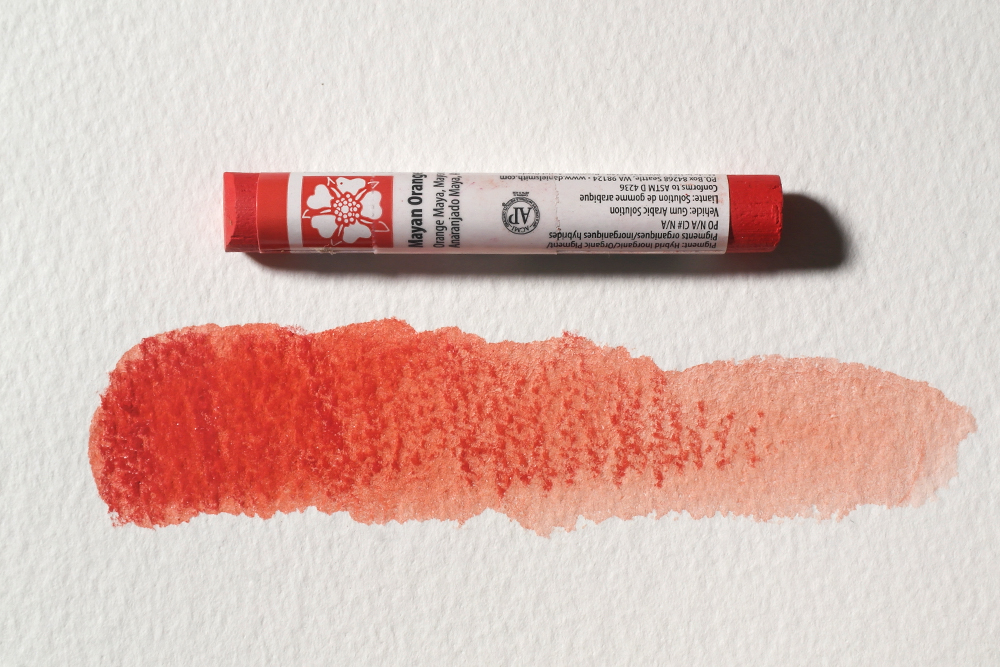
Mayan Orange is an intense, blazing red-orange that retains it strength even in dilute mixes. It takes inspiration from the rich, bold colours of Mayan murals and sculpture. Some of those original Mayan colours still remain today and have hardly faded despite centuries of exposure to severe heat and humdity. Using methods derived from ancient Mayan chemistry, these unique pigments have been recreated.
Lightfastness: Very Good
Transparency: Semi-Transparent
Staining: Low
Granulation: No
Pigment: PO N/A (Hybrid Inorganic/Organic Pigment)
Neutral Tint
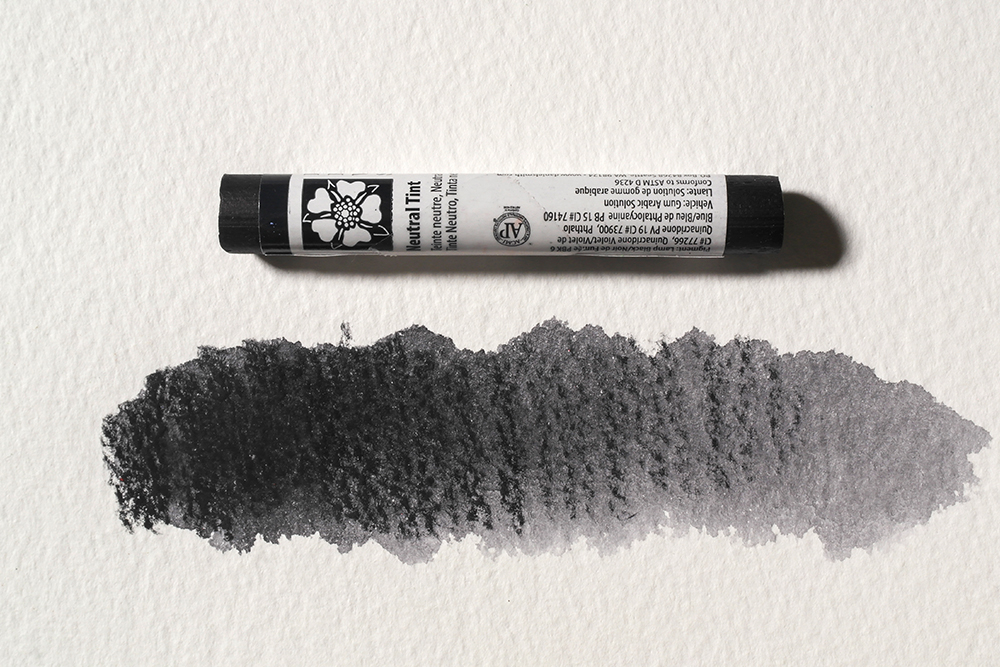
You can mix Neutral Tint with any other colour to produce a range of its darker values. Developed by Daniel Smith chemists, this colour is a perfect neutral grey. It is neither warm nor cool and is useful for reliably and quickly toning down colours. You can also use it to mix rich, luminous darks. Since its introduction to the main range in 2012 many artists have found this colour indispensible.
Lightfastness: Excellent
Transparency: Semi-Transparent
Staining: Low
Granulation: No
Pigment: PBk6, PV19, PB15 (Lamp Black – Quinacridone Violet – Phthalocyanine Blue)
Olive Green
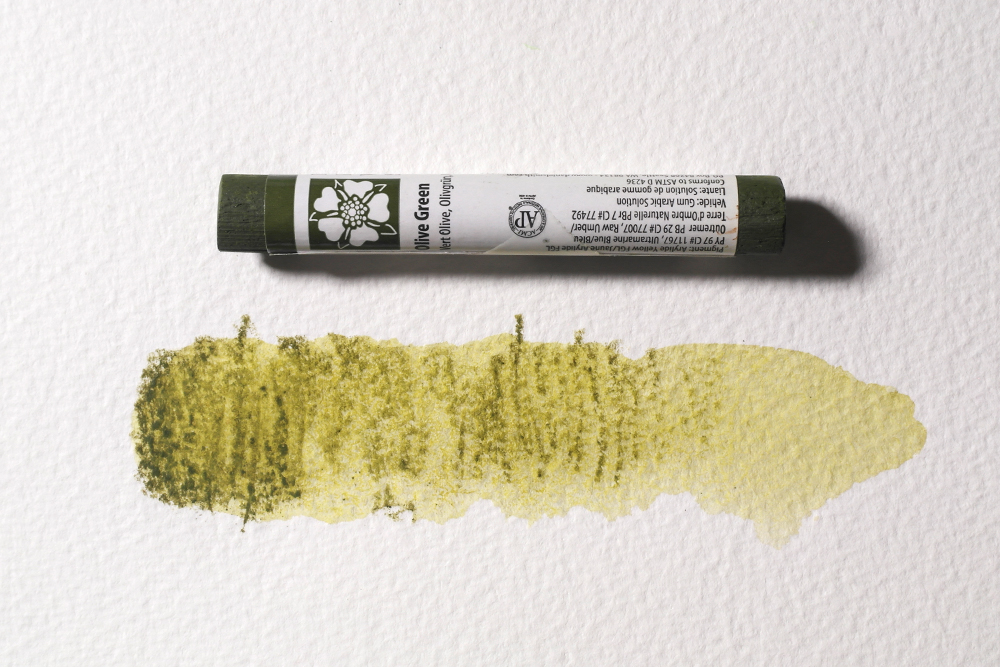
Olive Green is a rich, warm-brown green that brings to mind the colours of wet grasslands and dense woodland. It is a natural-looking green, making it a useful colour for landscape painters. It is made using a combination of PY97, PB29 and PBr7.
Lightfastness: Excellent
Transparency: Semi-Transparent
Staining: Low
Granulation: Yes
Pigment: PY97, PB29, PBr7 (Arylide Yellow FGL – Ultramarine Blue – Raw Umber)
Pearlescent White
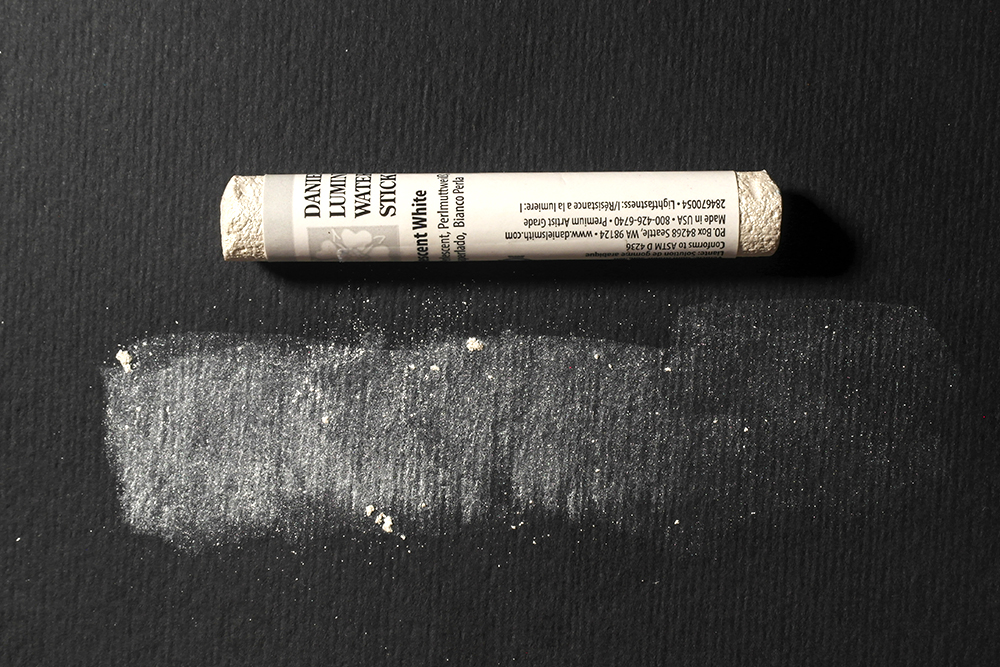
Pearlescent White is the second of the two new Luminescent colours in the watercolour stick range. Like Iridescent Electric Blue is has a gentle shimmering quality that creates the most impact on dark surfaces. Mix with other colours to create sparkling pastel tones or glaze over darker colours to impart a luminescent glow. These specality colours are made using mica pigments – thin transparent particles coated in highly reflective metal oxides.
Lightfastness: Excellent
Transparency: Transparent
Staining: Non Staining
Granulation: Yes
Pigment: PW20, PW6 (Mica – Titanium White)
Prussian Blue
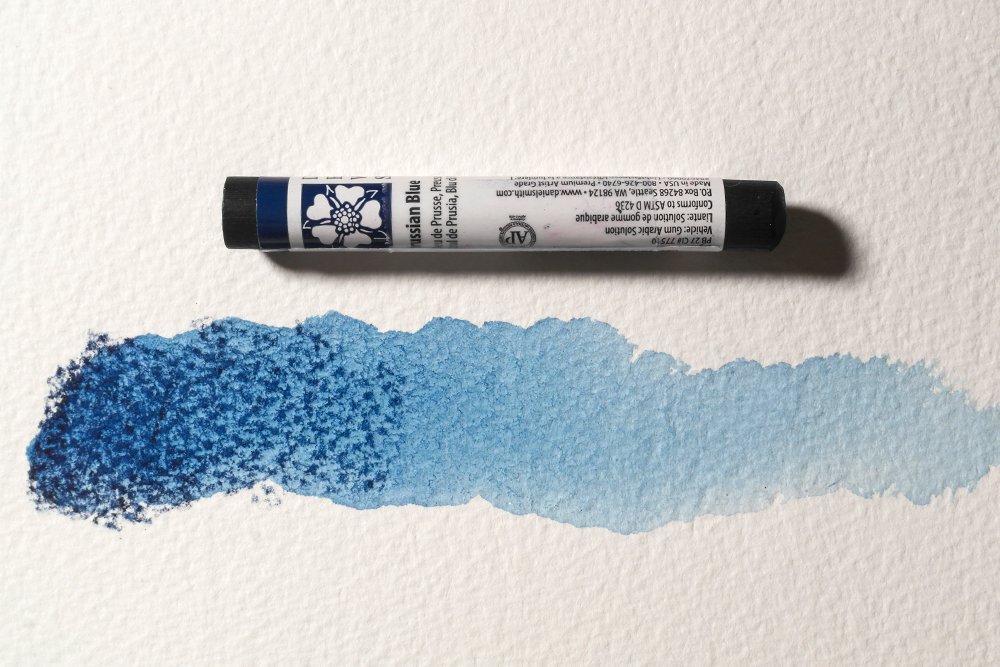
Prussian Blue is a palette staple for many. It has a dark value with a medium to high tinting strength and has a deep, ink-like quality that has drawn the attraction of artists since its creation. It disperses easily and evenly through washes and mixes. In some ways it is interchangeable with the higher staining Phthalo blue, however Pussian Blue does have a slightly greener hue.
Lightfastness: Excellent
Transparency: Transparent
Staining: Medium
Granulation: Yes
Pigment: PB27 (Prussian Blue)
Spring Green
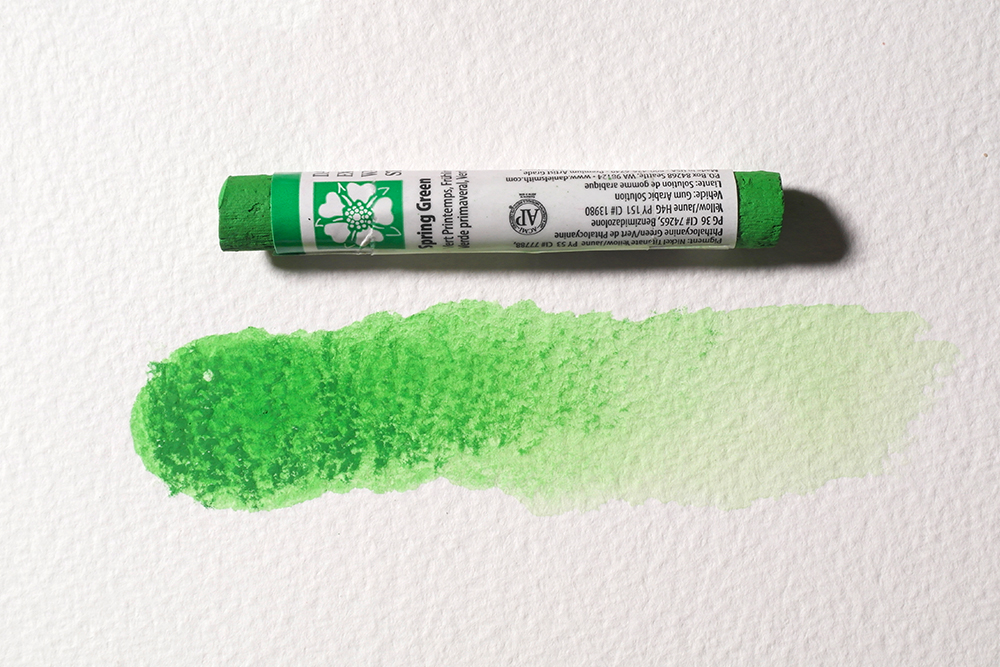
Spring Green combines two yellow pigments and one green pigment to create a clear, bright green. Straight from the stick it produces a vibrant, punchy green. Combine it with Pyrrol Orange (also available in a watercolour stick) to create more realistic looking, landscape-friendly greens.
Lightfastness: Excellent
Transparency: Semi-Transparent
Staining: Low
Granulation: No
Pigment: PY53, PG36, PY151 (Nickel Titanate Yellow – Phthalocyanine Green – Benzimidazolone Yellow)
Combine sticks with the rest of the Daniel Smith Watercolour range to unleash their full potential.
Daniel Smith Watercolour sticks are part of the broader Daniel Smith Extra Fine Watercolour range. Including a total of 266 colours across 15ml tubes, 5ml tubes, half pans and watercolour sticks, the Daniel Smith range offers arguably the most comprehensive and versatile range available to watercolourists.
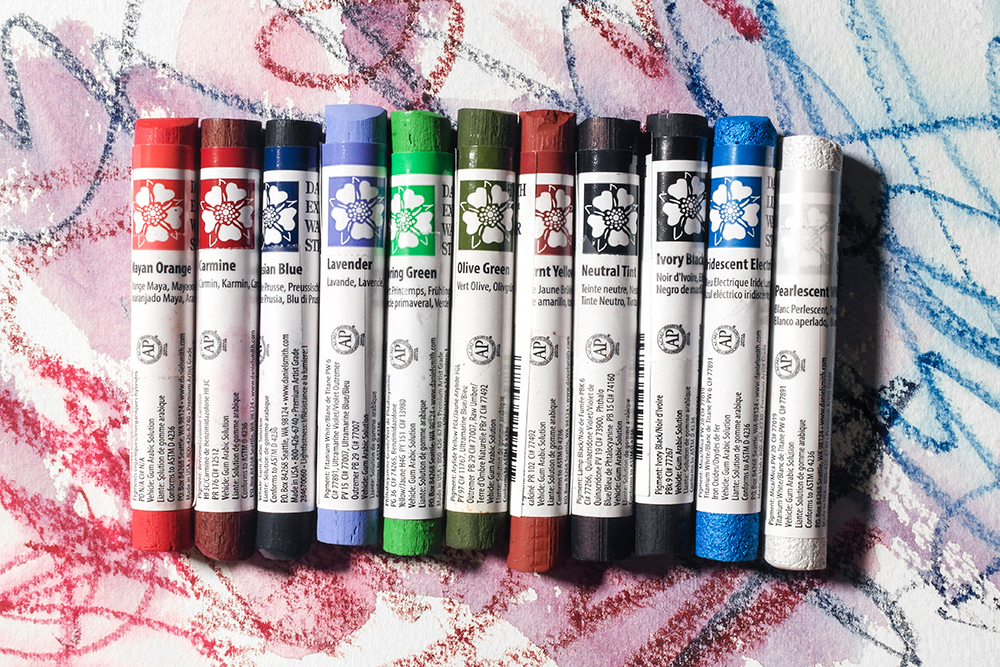
Not only does their range include colours, there are also a selection of Watercolour Grounds available. Paint these grounds onto almost any surface to transform it into a ground suitable for watercolour painting. You can use it on glass, metal, ceramic, wood and more. Mix and match all the different products to create your own custom collection of colours to suit your painting style.
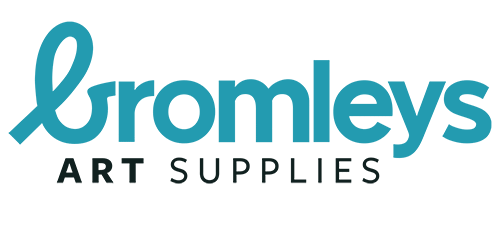


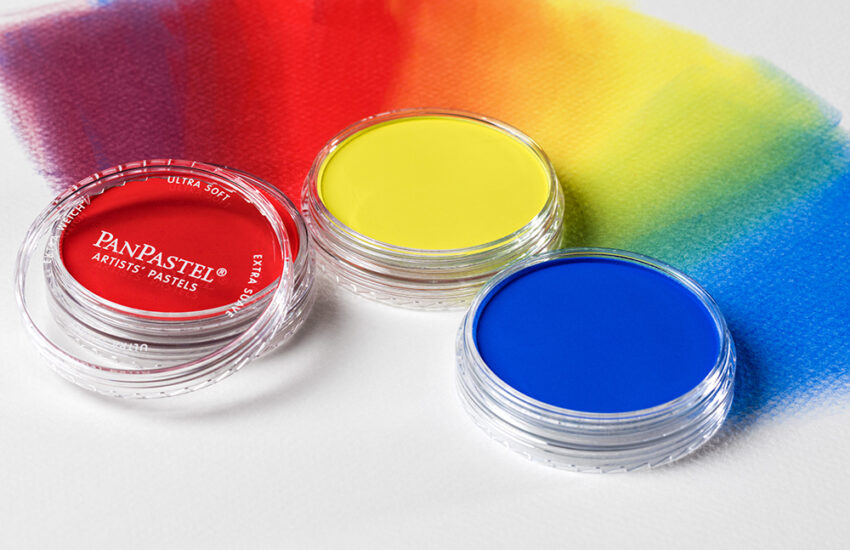
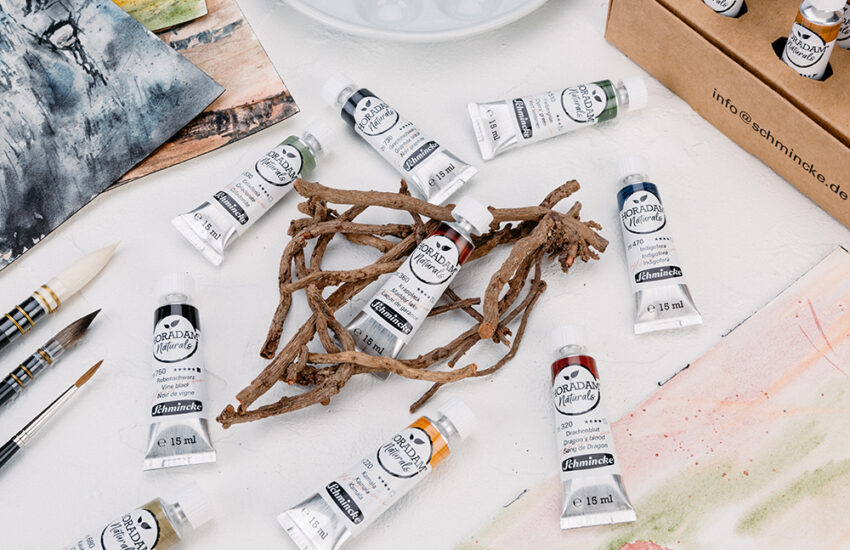
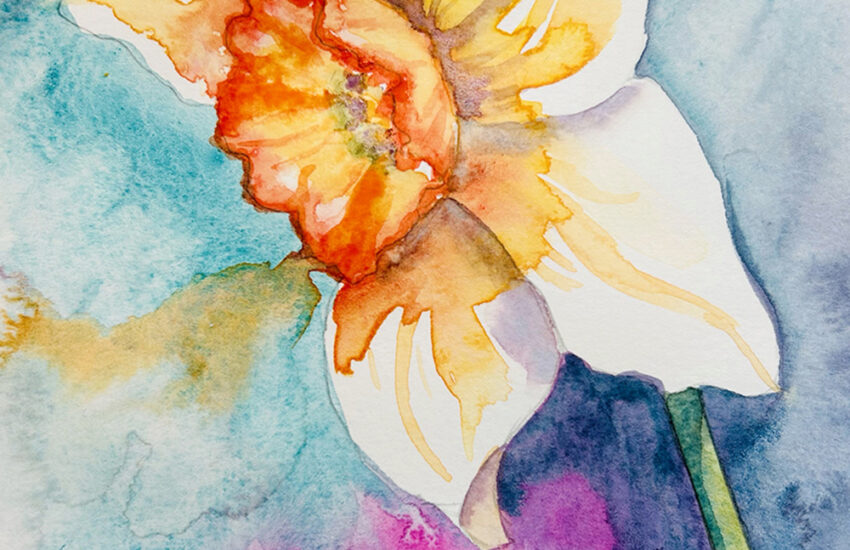
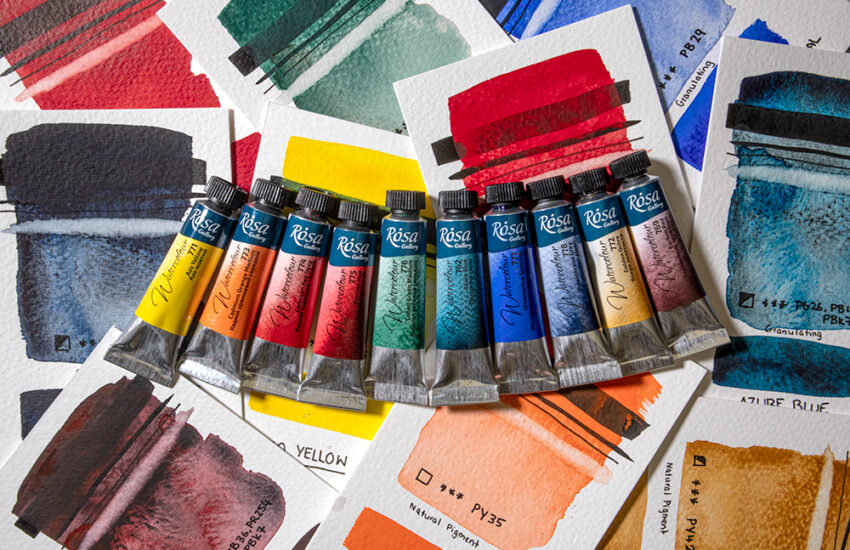


Hiya, Thanks very much Tanith for an excellent review/tutorial. I’m really surprised that the sticks have the equivalent of three whole pans. I’ve looked at these a few times and now you’ve convinced me so I’m going to treat myself to some for Christmas. XX
Hi David. So glad to hear that you found the blog post helpful! Hope you enjoy using your watercolour sticks over Christmas!